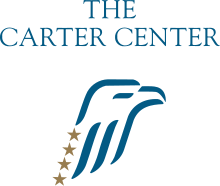
Back مركز كارتر Arabic مركز كارتر ARZ Centre Carter Catalan Carter Center German Centro Carter Esperanto Centro Carter Spanish مرکز کارتر Persian Fondation Carter French מרכז קרטר HE Carter Center Italian
 | |
| Founded | April 6, 1982[1] |
|---|---|
| Founders | Jimmy Carter Rosalynn Carter[1] |
| Type | Not-for-profit, non-governmental organization (IRS exemption status): 501(c)(3)[1] |
| 58-1454716 | |
| Focus | Human rights, Conflict resolution, Election monitoring, Public health, Eradication of infectious diseases, Mental health |
| Location | |
Area served | Global (75 countries since 1982)[2] |
| Method | Popular education, Access to information, Aid distribution |
Key people |
|
| Employees | 175; field office staff in more than a dozen countries[1] |
| Website | cartercenter.org |
| Partnered with Emory University | |
The Carter Center is a nongovernmental, nonprofit organization founded in 1982 by former U.S. President Jimmy Carter. He and his wife Rosalynn Carter partnered with Emory University after his defeat in the 1980 United States presidential election. The center is located in a shared building adjacent to the Jimmy Carter Library and Museum on 37 acres (150,000 m2) of parkland, on the site of the razed neighborhood of Copenhill, two miles (3 km) from downtown Atlanta, Georgia. The library and museum are owned and operated by the United States National Archives and Records Administration, while the center is governed by a Board of Trustees, consisting of business leaders, educators, former government officials, and philanthropists.
The Carter Center's goal is to advance human rights and alleviate human suffering.[3] The center has projects across 80 countries[4] including election monitoring, democratic institution-building, conflict mediation, and human rights advocacy. It also leads efforts to treat neglected tropical diseases, spearheading the campaign to eradicate dracunculiasis, as well as treating onchocerciasis, trachoma, lymphatic filariasis, and malaria.
In 2002, Jimmy Carter received the Nobel Peace Prize for his work "to find peaceful solutions to international conflicts, to advance democracy and human rights, and to promote economic and social development" through the Carter Center.[5] In 2007, he wrote an autobiography entitled Beyond the White House: Waging Peace, Fighting Disease, Building Hope, which chronicles the first 25 years of The Carter Center.
- ^ a b c d Cite error: The named reference
AR08-09 Work Glancewas invoked but never defined (see the help page). - ^ The Carter Center Annual Report 2008-09 (PDF). Atlanta: The Carter Center. 2010. pp. 80–81.
- ^ "The Carter Center At 30 Years". GeorgiaTrend. 31 October 2012. Retrieved 11 March 2013.
- ^ "The Carter Center – Waging Peace. Fighting Disease". The Carter Center.
- ^ Norwegian Nobel Committee, 2002 Nobel Peace Prize announcement, [1], October 11, 2002, accessed December 19, 2008.